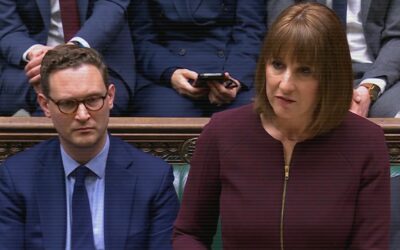On Wednesday 27 October, the Chancellor Rishi Sunak unveiled his Autumn Budget 2021.
This budget was billed as one looking ahead to the “post-Covid” era, with a lot of focus on growth and the economic outlet. Numerous news outlets have covered the major stories coming out of the budget. At TaxWatch, what we have scrutinised is the perhaps lesser covered tax stories.
1 – Additional Compliance Work
An additional £292m across three years was announced for HMRC, with the goal of ‘bearing down on tax avoidance and evasion’.
The Taxpayer Protection Taskforce, announced in the Spring 2021 budget, is to see an additional £55m of funding next year. This is in addition to the previously announced £100m investment. It is not clear whether this £55m is part of the aforementioned £292m.
This taskforce will seek to recoup money wrongly claimed from pandemic support schemes, such as furlough.1 The spring announcement on the Taxpayer Protection Taskforce stated that it will be staffed by “HMRC operatives” suggesting that staff are to be moved from elsewhere within HMRC.
The March 2021 Budget revealed that the extra spending on compliance would actually lead to less in tax being collected year on year until 2023-24, with one reason given being “impacts on compliance yield reflecting reprioritisation (including to respond to COVID19).”2

Budget 2021 policy decisions (£ million)
HMRC is set to see a “£0.9 billion cash increase over the Parliament to £5.2 billion in 2024-25”. Spending Review 2020 revealed that £1bn would be going to HMRC “to reform and enhance the UK customs system after the end of the transition period, including investment in vital physical and IT infrastructure and additional support for UK traders”.3 So while the £0.9bn cash increase sounds impressive, it’s worth bearing in mind that the vast majority of this will not go towards tackling tax fraud, but rather to deal with the additional complexities surrounding the UK’s departure from the European Union.
2 – Clamping down on promoters of tax avoidance
The budget also revealed that the forthcoming Finance Bill 2021-22 will feature legislation for further measures to clamp down on promoters of tax avoidance.
Section 5.74 of the budget announced that the measures will:
- allow HMRC to freeze a promoter’s assets so that the penalties they are liable for are paid
- deter offshore promoters by introducing a new penalty on the UK entities that support them
- provide for the closing down of companies and partnerships that promote tax avoidance schemes, and
- support taxpayers to steer clear of avoidance schemes or exit avoidance quickly, by sharing more information on promoters and their schemes.
In September 2020 we submitted evidence to HMRC as part of their consultation “Tackling Disguised Remuneration Tax Avoidance”,4 calling for those who sell disguised remuneration tax avoidance schemes to be investigated for tax fraud.
These proposed measures stop short of HMRC applying the full criminal law to prosecute those who design, operate, and promote dishonest tax avoidance schemes. TaxWatch’s view remains that the best deterrence is to put those who promote fraudulent schemes before a jury.
3 – R&D reliefs need to be made ‘fit for purpose’
Plans to increase R&D investment to £22bn per year, as outlined in the March 2020 budget, have been pushed back from a targeted May 2024 to 2026-27, with the government acknowledging that current R&D reliefs are not fully “fit for purpose.”
It has long been known that the cost of the R&D expenditure credits is far greater than what was originally anticipated, with a February 2020 NAO report highlighting that the actual costs were more than double those forecast.5

Costs compared with forecast for the research and development (R&D) expenditure credit
Sunak stated in his speech that:
“Companies claimed UK tax relief on £48bn of R&D spending. Yet UK business investment was around half of that, at just £26bn. We’re subsidising billions of pounds of R&D that isn’t even happening here in the United Kingdom. That’s unfair on British taxpayers.”
While it’s correct that there are issues with R&D reliefs, the cause of the problem isn’t necessarily research conducted abroad, but whether or not the research is conducted at all.
The total number of claims for R&D tax credits for 2019-20 was 85,900, with £7.4bn in relief claimed on £47.5bn of expenditure. The ONS estimates that businesses only carried out £25.9 billion of privately-financed R&D in the UK in 2019.6 Overseas expenditure can qualify for tax credits, and HMRC previously produced an initial estimate of £4 billion to £7 billion for overseas expenditure in the year ending March 2018. It is highly unlikely that the amount of overseas expenditure in 2019-20 was £21.6bn, the difference between UK R&D and total R&D claimed. Rather, the data points to large scale abuse.
The government said it would set out separate plans to combat abuse of R&D tax reliefs “later in the autumn”.
4 – Climate change given short shrift
With the UK hosting the 2021 United Nations Climate Change Conference, known as COP26, it seemed a little odd that there was so little on climate in the budget. A week prior to the budget, the UK Government had published its Net-Zero Strategy,7 with talk of “Removing dirty fossil fuels from the global economy.”
The chancellor failed to use the word “climate” even once during his budget speech. He did, however, reveal there would be a cut to the rate of air passenger duty on domestic flights, along with the cancellation of the planned rise in fuel duty.
Image by mohamed Hassan from Pixabay
1 Fraud and the Coronavirus Job Retention Scheme, Taxwatch, 12 May 2021, http://13.40.187.124/furlough_fraud/
2 Budget 2021, HM Treasury, March 2021, https://assets.publishing.service.gov.uk/government/uploads/system/uploads/attachment_data/file/966868/BUDGET_2021_-_web.pdf
3 Spending Review 2020, HM Treasury, 15 December 2020, https://www.gov.uk/government/publications/spending-review-2020-documents/spending-review-2020
5 The management of tax expenditures, National Audit Office, 14 February 2020, https://www.nao.org.uk/wp-content/uploads/2020/02/The-management-of-tax-expenditure.pdf
6 Research and Development Tax Credits Statistics, HMRC, September 2021, https://www.gov.uk/government/statistics/corporate-tax-research-and-development-tax-credit/research-and-development-tax-credits-statistics-september-2021
7 Net Zero Strategy: Build Back Greener, Department for Business, Energy & Industrial Strategy, 19 October 2021, https://www.gov.uk/government/publications/net-zero-strategy



